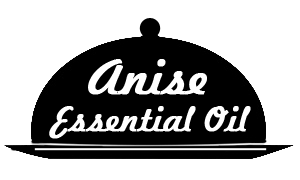
Anise essential oil is derived from the perennial herbal plant anise or aniseed (Pimpinella anisum). Although anise originated from Asia, it is prevalent in Mediterranean nations. Today, it is produced in Spain, France, and Russia, but also grows in the wild in other countries. It was the Romans who introduced anise to Europe, while early settlers brought it to North America. One of its primary uses was to promote digestive health. In ancient Rome, anise was often added (together with cumin and fennel) to a cake that was eaten after meals, while the Egyptians used the herb as an ingredient in breads.
Anise is often confused with fennel (Foeniculum vulgare) because both plants come from the Apiaceae family and have a similar taste. Anise is also confused with another herb called Chinese star anise (Illicium verum), which is widely used in Asian countries and used to make the drug Tamiflu.
Anise’s therapeutic benefits and licorice-like flavor were recognized and used by many ancient civilizations. Today, many pharmaceuticals seek to take advantage of anise’s benefits by adding the herb to certain drugs, like cough syrup and throat medications. However, as far as pharmaceuticals go, these drugs are neither all-natural nor safe. For you to maximize the benefits of this herb, I recommend you use it in its natural form, or as anise oil.
Uses:
Like other essential oils, anise oil should first be diluted before use. Essential oils are highly concentrated and may cause sensitizations in the user. Oil of anise should be first mixed with carrier oils like sweet almond oil, wheatgerm oil, and jojoba oil.
Once diluted, anise oil works best when inhaled or used in a diffuser. It can also be applied topically as a massage oil. Here are some specific ways you can experience anise oil’s benefits
The health benefits of Anise Essential Oil can be attributed to its properties as an anti-epileptic, anti-hysteric, anti-rheumatic, antiseptic, anti-spasmodic, aperient, carminative, cordial, decongestant, digestive, expectorant, insecticide, sedative, stimulant and vermifuge substance.
Narcotic and sedative – Can help ease epileptic and hysteric episodes. It is found effective in sedating nervous afflictions, hyper reactions and convulsions as well. However, this property should be used with caution, as heavy dosages can have adverse effects, particularly in children.
Pain reliever – Provides relief for arthritic pain.
Antirheumatic: This oil can give relief from rheumatic and arthritic pains by stimulating blood circulation, and by reducing the sensation of pain in the affected areas.
Antiseptic: This essential oil also has antiseptic properties and give wounds an effective protective layer against infections and sepsis. This aids in the faster healing of wounds.
Decongestant/expectorant – Helps eliminate congestion in the respiratory tract
Relieves respiratory conditions (colds, coughs, flu, and asthma) – Place two to three drops in a diffuser, or use in steam inhalation to clear phlegm and mucus
Flavoring agent – Used as a flavoring agent for food and beverages and an ingredient for salads and soups
Food processing – Anise and anise oils are used in processed meats like pepperoni, pizza toppings, Italian sausage, and similar food products
Breast milk production – Has phytoestrogenic properties
Libido enhancer – Used in ancient times as a sex driver enhancer and as an aphrodisiac
Natural head lice remover – Like coconut oil, anise oil is a safer alternative to chemical lice treatments
Insecticide: The essential oil of anise is toxic to insects and smaller animals, therefore its smell keeps insects away. For this reason, this oil can be employed to drive away insects by using it in fumigants, vaporizers, and sprays.
For oral health – Added to toothpastes, mouthwashes, and syrups
Fragrance – Added to soaps, detergents, lotions, and skin creams
Treats hiccups – Use two to three drops in steam inhalation
Freshens breath – Mix one to two drops with warm water and use as a gargle
Eases menstrual pain – Add two to three drops in a carrier oil and use as a massage oil in the affected area
Treats nausea, migraine, and vertigo – Place two to three drops on a cloth and inhale
Aperient: This oil has mild purgative properties, but is safe to use. Unlike other synthetic or harsh purgatives, it is not hard on the stomach and liver and does not leave you exhausted and fatigued. When taken in low dosages, it helps clear motions and cures constipation, resultant flatulence, and indigestion.
Carminative: Anise essential oil promotes the removal of gases and as a digestive, it does not let it form, as indigestion is the cause of excess gas.
Cordial: The warming effect of this oil on the respiratory and the circulatory systems makes it a cordial. This property helps counter colds, the deposition of phlegm, and problems like rheumatism and arthritis.
Relieves stomach cramps – Mix five drops of anise oil with one tablespoon of almond oil and massage unto your stomach
Digestive: This property of anise and anise essential oil is very commonly used to promote digestion. It has been an old practice to chew Anise seeds, to serve desserts containing Anise, or to have a glass of warm water with few drops of anise essential oil in it to aid digestion, especially after a heavy meal or a feast.
Sedative: Due to its somewhat narcotic or numbing effects, it is used as a sedative for anxiety, nervous afflictions, depression, anger, and stress as well as for symptoms such as insomnia due to its tranquilizing and relaxing effects. This effect is particularly visible when it is used in higher dosages, since in very small doses, it acts as a stimulant. However, the utmost care should be taken while administering it in heavy doses, keeping in view its narcotic effects.
Stimulant: The stimulating property of anise essential oil can benefit us in the following ways. It can stimulate circulation and give relief from rheumatism and arthritis, stimulate secretion of enzymes and hormones, thus boosting the whole metabolism and finally, it can stimulate the nervous system and the brain to make us more active and alert.
Vermifuge: This is yet another aspect of its insecticidal property. It can kill worms found in the intestines. This property can be particularly beneficial for children, as they are most commonly afflicted with intestinal worms.
A Few Words of Caution: In heavy doses, it has narcotic effects and slows down respiration and circulation. It is poisonous to certain small animals and birds and therefore children should not be given high doses. Furthermore, it may cause irritation to certain skin types. It is best to avoid it during pregnancy. It may also aggravate certain types of cancers caused due to its effect on the estrogen hormone.
The antibacterial properties of anise oil make it useful against bacterial strains like Staphylococcus aureus, Streptococcus pyogenes, Escherichia coli, and Corynebacterium ovis. Anethol, aniseed’s predominant constituent, has antimicrobial and antifungal activities, making it useful against Candida albicans and fungal strains like Alternaria, Aspergillus, Cladosporium, Fusarium, and Penicillin.
When applied to wounds and bruises, anise oil can help speed up healing and provide a protective layer to prevent infections.
Is Anise Oil Safe?
The anethol and estragole found in anise seeds have a structure similar to that of a compound called safrole, a known hepatotoxin and carcinogen. While anethol and estragole have shown toxicity in rodents, anise oil is deemed generally safe for human consumption. It does not pose a threat to humans when it is consumed or used in moderation.
However, when used or consumed in heavy doses, it was found to aggravate certain type of cancers, as anise is an estrogenic agent. Pregnant and nursing women may benefit from using this essential oil, particularly to promote breast milk production and normal menstruation and to reduce pain. The oil may even benefit men by boosting their libido. However, I strongly advise consulting a physician before use.
Parents should also avoid administering anise oil or any essential oil directly on the highly delicate skin of infants and young children.
As is the case with other oils, anise oil can cause allergic reactions in some people. Individuals with any type of skin condition should avoid using this oil. Avoid this oil if you have allergies to pollen, celery, or carrots. It can take one to five milliliters of anise oil to cause nausea, vomiting, seizures, and pulmonary edema.
Health Benefits of Anise Essential Oil









